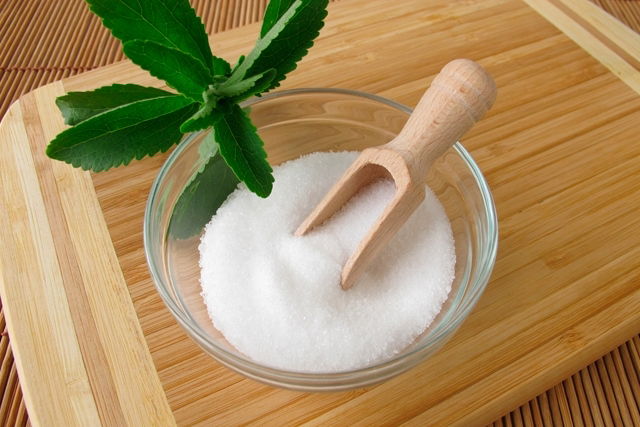Stevia is a natural sweetener that is safe for health and can help regulate blood sugar levels, promote cardiovascular health, and support weight loss.
Extracted from the Stevia rebaudiana Bertoni plant, this sweetener can replace sugar in drinks like juice and coffee, in baked goods such as cakes, or in processed foods like sodas, chocolate, and jams.
Stevia has a slightly bitter aftertaste and is 200 to 300 times sweeter than sugar. It can be found in pharmacies and health food stores in powder, granulated, or liquid form.

Is stevia safe?
Stevia is considered safe for health and can be used by most people, including pregnant or breastfeeding women and children.
However, it should preferably be used under the guidance of a doctor or nutritionist and within the safe daily limit, which is 4 mg per kilogram of body weight per day.
Health benefits
The main benefits of using stevia include:
1. Helps regulate blood sugar levels
Because it does not contain sugar, stevia can help manage blood sugar levels and may be beneficial for people with diabetes.
Still, it’s important to note that stevia is not a medication and should not replace medical treatment or prescribed diabetes medications.
2. May help with weight loss
Stevia is low in calories and can slightly reduce total daily calorie intake, which may help with weight loss, especially when used as a substitute for sugar.
The weight loss effect of stevia is typically small and temporary. To achieve long-term weight control, it’s important to maintain a healthy, balanced diet and engage in regular physical activity.
3. Has antioxidant and anti-inflammatory effects
Stevia contains antioxidant compounds that protect cells from damage caused by free radicals.
It may also help reduce inflammation in the body, supporting overall health and potentially lowering the risk of certain chronic diseases.
4. Promotes cardiovascular health
Stevia may promote cardiovascular health by helping to lower blood pressure and blood fat levels, thanks to compounds called steviol glycosides.
These compounds help relax blood vessels and promote diuresis, improving blood flow and reducing blood pressure.
Stevia may also reduce inflammation and oxidative stress in the arteries, protecting them and decreasing the risk of fat buildup in the blood.
5. Reduces the risk of cavities
By replacing sugar, stevia can help maintain oral health and reduce the risk of cavities.
This happens because sugar supports the growth of Streptococcus mutans bacteria, which are linked to tooth decay.
How to use
Stevia can be used to sweeten any food or beverage, such as coffee and tea. Because it remains stable at high temperatures, stevia can also be used in baked goods like cakes and cookies.
The safe daily amount of stevia is up to 4 mg per kilogram of body weight per day.
Possible side effects
Stevia is generally safe, but in some people, it may cause mild side effects such as nausea, dizziness, or bloating.
Who should avoid it
People with diabetes, high blood pressure, or kidney problems, as well as pregnant or breastfeeding women and children, should use stevia only under the supervision of a doctor or nutritionist.
Additionally, people who take medications or supplements regularly should consult a doctor before using stevia, as it may alter the effects of certain drugs or supplements.






























